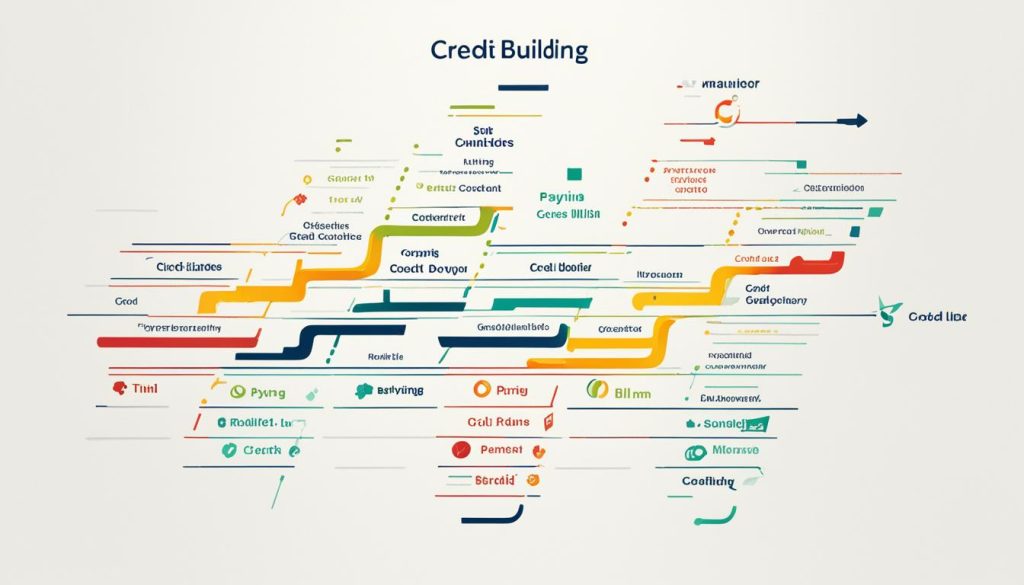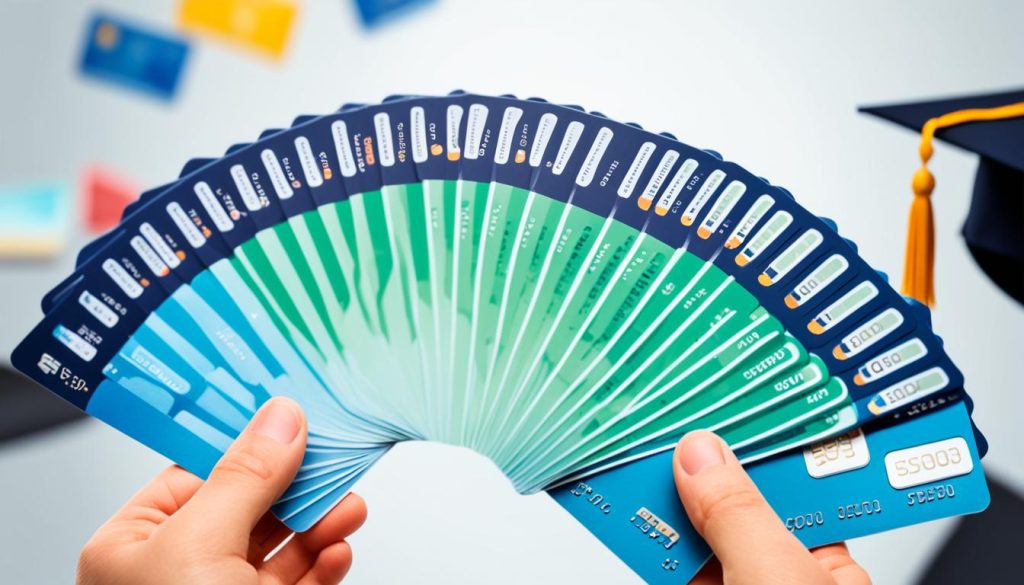As a college student, getting into credit cards can seem overwhelming. But, student credit cards are a great way to start building your credit, getting rewards, and learning about money management. They’re made to teach you how to make smart financial choices and help you build a solid financial base1.
These cards come with cool rewards like cash back, travel points, or store credits to help with college costs1. They also have no annual fees, no foreign transaction fees, and tools to help you manage your money well1. Using a student credit card right can help you create a good credit history. This is key for things like getting car loans, mortgages, or renting a place later on1.
Key Takeaways
- Student credit cards offer rewards, benefits, and financial education tools to help build credit and manage finances.
- These cards provide features like cash back, travel rewards, and no annual fees to support college students.
- Responsible use of a student credit card can help establish a positive credit history for the future.
- Student credit cards are designed to be both a learning tool and a financial resource.
- Explore student credit card options to find the best fit for your needs and financial goals.
What is a Student Credit Card?
A student credit card is made just for college and university students2. These cards have lower credit limits and higher interest rates than regular cards. This is because students usually don’t have much credit history2. They are only for students who are actively in college or trade school2. These cards help students start building their credit while they’re in school.
Key Features of Student Credit Cards
Student credit cards have rewards and benefits that fit a student’s life and needs2. You can get cash back on things like clothes, food, and school stuff like books and streaming services2. They also have easier rules to get one than regular credit cards, helping students with little or no credit history2.
To get a student credit card, you must be in school full-time or part-time at a two- or four-year college2. Some cards are even for trade school students2. These cards are great for young adults wanting to start building their credit2.
Student credit cards are good for building credit, but they usually have lower limits and higher rates than regular cards2. Also, some benefits might not be the same after you graduate and switch to a regular credit card2.
Benefits of Using a Student Credit Card
As a student, a credit card can be a great tool for building your credit and learning about money management. With a student credit card, you get to enjoy benefits that help you succeed financially.
Building Your Credit Score
Using a student credit card helps you start building your credit score3. Your payment history is key, making up 35% of your FICO score3. Paying on time shows you’re a responsible borrower, which helps your credit score grow3.
Student credit cards are easier to get than regular ones, perfect for those with little or no credit4. They let you start building your credit from scratch.
“Student credit cards are tailored for individuals with little to no credit history, offering a chance to start building your credit profile.”
Using your student credit card wisely, like keeping a low credit use and paying on time, boosts your credit score3. This opens doors to more financial opportunities later.
But remember, student credit cards have higher interest rates, about 20% on average3. Use them wisely to avoid debt and protect your credit score3.
Rewards and Perks
Many student credit cards offer rewards like cash back or points on everyday buys4. These rewards can help with things like book costs, travel, or college expenses4. Some cards also have perks like no annual fees or no foreign transaction fees, saving you money.
By using these rewards and perks, students can make their money go further and get more value from their credit cards345.
Student Credit Cards: Rewards, Benefits & Education
Managing your finances in college can feel overwhelming. But, student credit cards can offer rewards, benefits, and tools to ease your transition to adulthood6.
Many student credit cards let you earn up to 5% cash back in certain areas like groceries, dining, or gas6. For instance, the Discover it® Student Cash Back card has great rotating bonus categories6. The Capital One SavorOne Student Cash Rewards Credit Card gives 8% cash back on Capital One Entertainment and 3% back in popular spending areas for students6.
Student credit cards also offer educational resources to help you manage money wisely. These include credit monitoring, budgeting tools, and advice on using credit responsibly7. Using these tools can help you develop good financial habits that last beyond college.
| Card | Rewards Rate | Key Benefits |
|---|---|---|
| Discover it® Student Cash Back | 5% cash back in rotating categories | No annual fee, credit monitoring, and credit education tools |
| Capital One SavorOne Student Cash Rewards Credit Card | 8% cash back on Capital One Entertainment, 3% back in popular categories | No annual fee, access to credit monitoring and budgeting tools |
| Capital One Quicksilver Student Cash Rewards Credit Card | 1.5% cash back on all purchases | No annual fee, access to credit monitoring and budgeting tools |
Choosing the right student credit card can give you rewards and benefits while building a good credit history and financial skills6. These tools can set you up for financial success in college and beyond7.
“Student credit cards can be a valuable tool for building credit and learning responsible financial habits during the college years.”
When picking a student credit card, focus on features that match your spending and financial goals. Look for cards with rewards in areas you spend a lot on, like groceries, dining, or gas7. Also, choose cards with educational resources and tools to help you build a solid financial base.
Choosing the Right Student Credit Card
When picking a student credit card, there are key factors to think about8. These cards are for people aged 18-21 who don’t have much credit yet8. If you’re under 21, you’ll need to show you can pay the bill or have someone co-sign for you. If you’re over 21, you can use income you have easy access to, like your partner’s earnings8.
Look for a card with a low introductory APR to avoid high-interest charges as you build your credit8. Also, check if the card reports to all three major credit bureaus. This can greatly affect your credit score8.
Rewards programs are important too. Choose a card that matches your spending, like cash back or travel points8. For example, the Discover it® Student Chrome gives 2% cash back at gas stations and restaurants. The Discover it® Student Cash Back offers 5% cash back on certain purchases and matches your cash back at the end of the first year8.
Also, pick a card with no annual fee to save money over time8. Cards like the Deserve® EDU Mastercard for Students have no annual fees and no foreign transaction fees, great for students with little credit history8.
Factors to Consider
- Annual Percentage Rate (APR)
- Credit Limit
- Reporting to Credit Bureaus
- Rewards Program
- Annual Fees
- Foreign Transaction Fees
Think about these factors to find a student credit card that helps you now and in the future8910.
“Having a good credit score is key. It helps you get loans and can lower your interest rates10. A top credit score can save you thousands over a 30-year mortgage10.”
| Card | Annual Fee | Cash Back | Foreign Transaction Fees |
|---|---|---|---|
| Discover it® Student Chrome | $0 | 2% at gas stations and restaurants | $0 |
| Discover it® Student Cash Back | $0 | 5% on rotating categories, 1% on other purchases | $0 |
| Deserve® EDU Mastercard for Students | $0 | 1% on all purchases | $0 |
| Chase Freedom Rise℠ | $0 | 1.5% on all purchases | N/A |
By looking at these factors and comparing cards, you can pick the best one for your spending and credit goals8910.
Responsible Credit Card Usage for Students
It’s important for students to learn how to use credit cards wisely. This helps build a solid financial base. By doing so, you can enjoy the perks without running into trouble11.
Tips for Responsible Usage
- Always pay your bill on time. This is key for your credit score12. Paying on time helps you build a good credit history and saves you from late fees and interest.
- Keep your credit use below 30% of your limit12. This is what experts recommend. Keeping it low can help improve your credit score.
- Try not to carry a balance. High balances can lead to huge debt from high interest rates12. Aim to pay off your balance each month to dodge interest.
- Watch your spending and stick to your budget. Your credit card can show you where you spend the most money. This can help you see where you might need to cut back13.
- Use student credit cards with rewards. Some offer cash back, points, or miles that can save you money13.
By using these tips, you can improve your credit score, get rewards, and prepare for a better financial future111213.
“Responsible credit card usage is the key to unlocking the benefits of student credit cards while avoiding potential pitfalls.”
With discipline and smart money habits, your student credit card can be a great tool for reaching your goals111213.
Alternatives to Student Credit Cards
Student credit cards can be useful for building credit, but they might not work for everyone. Luckily, there are other ways to start building credit and learn good financial habits. You can try secured credit cards, credit-builder loans, or become an authorized user on a family member’s card14.
Secured credit cards are a good choice. They require a deposit, usually $200 to $500, which becomes your credit limit. This deposit makes you eligible for the card, even if you have no credit history14. For example, the OpenSky® Secured Visa® Credit Card has a $35 annual fee and a low minimum deposit of $20014.
Credit-builder loans are another option. They help you build or improve your credit score. You make regular payments on the loan, and the lender reports your payments to credit agencies. After you pay off the loan, you get the money back, helping you build your credit further14.
Becoming an authorized user on a family member’s credit card is also a great way to build credit. As an authorized user, you get to use the account’s good payment history to improve your credit score over time14.
These alternatives to student credit cards have many benefits. They offer things like:
- Discover it® Student Cash Back: Gives 5% cash back on up to $1,500 spent in bonus categories14.
- Capital One SavorOne Student Cash Rewards Credit Card: Offers 3% cash back on groceries, restaurants, streaming services, and entertainment14.
- Capital One Quicksilver Student Cash Rewards Credit Card: Gives 1.5 – 5% cash back on purchases14.
- Five Star Bank College Rewards Visa® Credit Card: Offers 2,500 points as a welcome bonus14.
- Patelco Credit Union Progress Student Rewards Mastercard® Credit Card: Has a high rewards rate and special rewards for those with little or no credit history14.
WalletHub says credit cards for students with no credit usually have no annual fees. They also report to 1-3 major credit agencies each month to help build your credit14.
By looking into these alternatives, you can find the best way to build your credit and learn good financial habits. You might even earn rewards and benefits along the way.
Conclusion
Student credit cards are great for college students wanting to build their credit and enjoy rewards15. They let you pick the best card for you and use it wisely for financial success15. They’re perfect for those starting or improving their credit journey, offering a flexible way to reach your financial goals16. Keeping a good credit score is key, affecting things like renting, getting loans, and interest rates16.
Getting into student credit cards might seem tough, but with the right info and attitude, you can make the most of them17. Use educational resources and smart tips to build a solid credit history and secure your financial future17. The main thing is to pick the right card and use it well, using rewards to your benefit.
As you start with credit, keep in mind what affects your eligibility and how your choices impact your credit score17. By being informed and making wise financial decisions, you can fully benefit from student credit cards and set yourself up for a bright financial future.
FAQ
What is a student credit card?
What are the key features of student credit cards?
What are the benefits of using a student credit card?
What types of rewards and benefits do student credit cards offer?
What should I consider when choosing a student credit card?
How can I use a student credit card responsibly?
What are some alternatives to student credit cards?
Source Links
- Understanding Credit Cards | Financial Literacy
- Articles
- Pros And Cons Of Student Credit Cards | Bankrate
- What are the Benefits of a Student Credit Card?
- Student Credit Card: Meaning, Benefits, Risks
- Best College Student Credit Cards of July 2024 – NerdWallet
- Student Credit Card Benefits: What to Know | Chase
- How to Choose a Student Credit Card – NerdWallet
- How to Pick the Right Student Credit Card | Chase
- Should You Get a Student Credit Card? | BestColleges
- Credit Cards for College Students | Capital One
- 5 Tips for Using Your Student Credit Card Responsibly – NerdWallet
- 6 Reasons to Have a Credit Card in College | CollegeData
- 5 Best Credit Cards for Students with No Credit (July 2024) | WalletHub
- Student Credit Cards vs. Regular: What’s the Difference?
- What Happens to Student Credit Cards When You Graduate? | Chase
- At What Age Can You Still Get A Student Credit Card? | Bright



